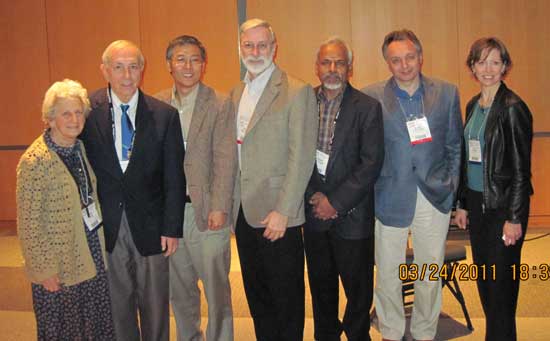Migrations of physicists
Session X8 the March meeting
Chaired and reported by Noémie Koller
This session was planned and co-sponsored with the Forum for the History of Physics to display some of the issues that arose in the last century related to the major migrations of physicists, for a variety of reasons, from their country of origin to a more accepting environment somewhere else in the world, and, in some cases, back to where they came from after the crisis subsided. Each case presented unique challenges, and time limits restricted the choice of topics to Europe under the Nazi occupation, Russia before and after the fall of the Soviet Union, Brazil, and China. The transformational effect on the conduct of science in the U.S. and the world at large resulting from these mass movements were highlighted. Five talks were planned for the session. However, Professor Santoro was not able to attend the meeting and a prepared Skype presentation was excluded by the lack of connectivity in the lecture hall. Some of the presentations are available in pdf format in the APS website.
Migration of scientists and the International Center for Theoretical Physics: a personal and professional perspective
Katepalli R. Sreenivasan, New York University
Professor Katepalli Sreenivasan was educated in India, Australia and Johns Hopkins University. He held appointments as Dean of Engineering and Applied Science at Yale, Distinguished University Professor at Johns Hopkins, Director of the Institute for Physical Science and Technology, Director of the International Center for Theoretical Physics in Trieste. He was awarded the UNESCO Medal for promoting International scientific cooperation and world peace, and the Nicholson Medal for human rights outreach. He is currently a Senior Vice Provost at New York University and will lead the science and Technology research effort at the NYU Abu Dhabi campus.
Physicists' Forced Migration under Hitler
Alan Beyerchen, Ohio State University
Professor Beyerchen teaches German History at Ohio State University in Columbus Ohio. He has focused his research on 19th and 20th century German social, economic, political, and cultural history, and on the web of cultural relationships among science technology and the values of modernity. His current studies concern Clausewitz and the quest for a science of war and is published in the book "Clausewitz, Nonlinearity and the unpredictability of war". He is best known to this audience as author of Scientists under Hitler: "Politics and the Physics Community under the Third Reich".
Migrations and the rise of High Energy Physics in Brazil
Alberto Santoro, UERJ, Brazil
Professor Alberto Santoro received his PhD from the Université Denis Diderot, Paris VII. He spent most of his career at the Universidade do Estado do Rio de Janeiro. He is a high energy physicist and participates in the CERN CMS collaboration at the LHC. He has been involved for many years in the development of the HEP Grid with the goal of improving the necessary technology to enhance the collaborations between Brazil, Latin America and European Networks in high energy physics.
Russian, Soviet, and post-Soviet scientific migration: history and pattern
Alexei Kojevnikov, University of British Columbia
Professor Sergei Kojevnikov is currently at the University of British Columbia. He is a senior research associate at the Institute for History of Science and Technology at the Russian Academy of Sciences in Moscow. He has published books on the History of Science in particular modern physics in the 20th century from Einstein relativity and quantum mechanics to the creation of atomic weapons, modern quantum theory and cosmology. He has also authored a book on the History of the Soviet Union, discussing the role of science and scientists in Soviet culture and politics, the relationship between science ideology and the military and the general social and institutional history of Soviet and Russian science.
Chinese/American physicist: a transnational history
Zuoyue Wang, California State Polytechnic University, Pomona
Professor Zuoyue Wang teaches history and technology developments in the U.S. and China, U.S. cold war policy, and accomplishments by Asian-Chinese-Americans at the California State Polytechnic University. He is the author of "In Sputnik's Shadow: the President's Advisory Committee and cold war America", and "Chinese American Scientists: A transitional History". He was educated at the Normal University in Xinxiang, and the Chinese Academy of Sciences in Beijing, receiving a PhD from the University of California in Santa Barbara.

Session participants L to R: Noémie Koller (Chair), Marty Blume (APS Editor-in-Chief Emeritus), Zuoyue Wang, Alan Beyerchen, Katepalli R. Steeni-vasan, Alexei Kojevnikov, Amy Flatten (Director, OIA)
Noémie Koller, a Professor at Rutgers University and Past-Chair of FIP, is the winner of the Nicholsen Medal for Human Outreach.
Disclaimer - The articles and opinion pieces found in this issue of the APS Forum on International Physics Newsletter are not peer refereed and represent solely the views of the authors and not necessarily the views of the APS.
